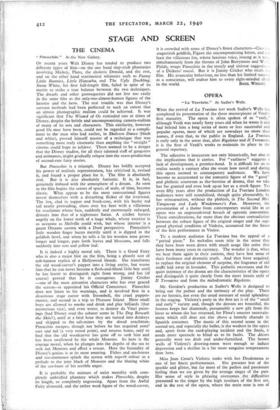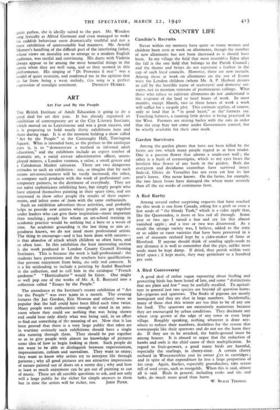OPERA
" La Traviata." At Sadler's Wells.
Wrrti the revival of La Traviata last week Sadler's Wells has completed its presentation of the three masterpieces of Verdi's first maturity. The opera is often spoken of as " early," although Verdi was nearly forty years old when he wrote it and had behind him a long series of more or less successful and popular operas, most of which are nowadays no more than names, if even that, to the public in England. La Traviata is early only in the sense that, after Rigoletto and Il Trovatore, it is the first of Verdi's works to maintain its place in the general repertory.
The adjective is inaccurate not only historically, but also in the implications that it carries. For " earliness " suggests a lack of development, a prentice-hand. It is difficult for us to realise nearly a century after the event how novel and daring this opera seemed to contemporary audiences. We have become so accustomed to the romantic figure of the "good " and phthisic courtesan as the-heroine of drama, that we take her for granted and even look upon her as a stock figure. Yet even fifty years after the production of La Traviata London audiences were still scandalised, though quite pleasurably, by her reincarnation, without the phthisis, in The Second Mrs. Tanqueray and Lady Windermere's Fan. Moreover, the presentation of a theme from contemporary social life in an opera was an unprecedented breach of operatic convention. These considerations, far more than the obvious contradiction between the robust figure of the original singer and the sup- posed physical condition of Violetta, accounted for the fiasco of the first performance in Venice.
To a modern audience La Traviata has the appeal of a " period piece." Its melodies seem trite in the sense that they have been worn down with much usage like coins that have been many years in currency. The wonder is that, when we hear them again in their context, they have lost none of their freshness and dramatic truth. And they have acquired, to replace the original element of surprise, the fragrance of old stuffs laid away in lavender. This pathetic sweetness and the quiet intimacy of the drama are the characteristics of the opera and distinguish it quite clearly from the more heroic style of II Trovatore and from the melodramatic Rigoletto.
Mr. Gordon's production at Sadler's Wells is designed to bring out the pathos and the intimacy of the play. There are no heroics, nor even the usual measure of social splendour in the staging. Violetta's party in the first act is of the " small and early " variety and, though the dresses are beautiful, the hostess keeps her diamonds, presumably a new gift from the lover to whom she has returned, for Flora's smarter entertain- ment which still does not rise above -a homely charade in Spanish costumes. The music of this second scene in the second act, and especially the ballet, is the weakest in the opera
and, apart from the card-playing incident and the finale, it needs more spectacle to blind us to its faults. The decors
generally were too drab and under-furnished. The brown walls of Violetta's drawing-room were enough to induce depression and a decline in a far more sanguine temperament than hers.
Miss Joan Cross's Violetta ranks with her. Desdemona as
one of. her finest performances. She presents less of the sparkle and glitter, but far more of the pathos. and passionate feeling than we are given by the average singer of the part. Her sense of style in phrasing overcomes.,the difficulties presented to the singer by the high tessitura of the first act, and in the rest of the opera, where the main note is one of quiet pathos, she is ideally suited to the part. Mr. Wendon sang lyrically as Alfred Germont and even managed to make his caddish behaviour seem dramatically truthful and not a mere exhibition of unreasonable bad manners. Mr. Arnold Matters's handling of the difficult part of the interfering father, whose views on morality are so strange to a modern English audience, was tactful and convincing. His duets with Violetta always appear to be among the most beautiful things in the opera when they are well sung, and so they seemed in this performance. His singing of " Di Provenza il mar " was a model of quiet restraint, and confirmed me in the opinion that so far from being a weak melody, this song is a perfect expression of nostalgic sentiment. DYNELEY HUSSEY.







































 Previous page
Previous page